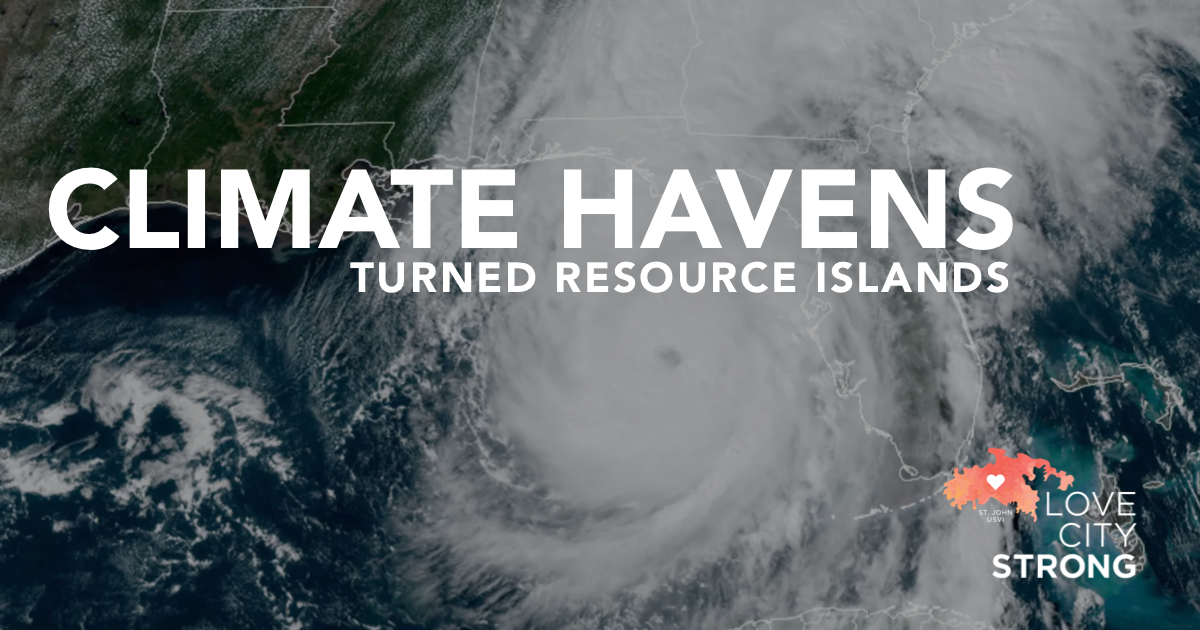
Asheville, North Carolina has long been revered for its temperate climate. In the 19th century, its growth was fueled by the theory that it had the climate to cure tuberculosis, and its fresh air and natural beauty have drawn tourists and would be residents ever since. In recent years, climate migration and climate gentrification became increasingly critical conversations as Asheville became touted as a “climate haven”, a city deemed more resilient to climate change, and better able to take in newcomers due to (relatively) affordable housing options and (relatively) forward thinking governance. In 2020, I encouraged my mother to move to Asheville instead of Savannah, or Charleston, on the grounds that it was safer from the impacts of climate change.
The last several days have obliterated any sense of Asheville as a haven from the effects of climate change, and I spent a frantic few days trying to find a way, from the USVI, to help my mother get out of the safe haven I’d recommended. As always, there are lessons to be learned from the devastation. In this case, the growing risks from inland rain events associated with tropical systems, the resulting resource islands and related barriers to recovery, and the importance of cultivating local knowledge and valuing state- and federal-level expertise in emergency management.
Inland Impacts
At 5 pm on September 25th, Hurricane Helene was a Category 1 storm located just north of Cancun, Mexico. A mere 30 hours later, following a period of rapid intensification, Helene made landfall on Thursday evening, September 26th, near Perry, Florida, as a Category 4 storm with winds of 140 mph. The storm then proceeded inland just east of Tallahassee, leaving a trail of destruction north into Georgia, South Carolina, and the southern Appalachian mountains of North Carolina and Tennessee. As of October 1st, there are at least 130 deaths attributed to Helene, and more than 600 people still missing. Asheville sits at 2,000 feet above sea level, nearly 300 miles from the nearest coastline. Nowhere, it would seem, remains safe from the inland impacts of the modern major hurricane.
Inland flooding as a result of tropical cyclones has increasingly become a concern over the past several years. A warmer atmosphere also holds more moisture – approximately 7% more moisture per 1°C of warming. This can help drive rapid intensification, but also means that warmer years are producing wetter storms, driving torrential rain impacts further inland. Over the last year, the National Oceanic and Atmospheric Administration (NOAA) has been rolling out their new “Cone of Concern”, which includes tropical storm and hurricane watches and warnings for inland counties in addition to coastal counties. Additionally, increased outreach regarding the risks of storm surge and flash flooding has been prioritized by federal, state, and local agencies.
In Western North Carolina last week, the region was already experiencing flooding as a result of a front that had stalled. When Helene passed through, more than 20 inches of rain fell on already waterlogged ground, sending the major rivers in the area into extreme flood stage with startling intensity. The Swannanoa River crested at 26.1 feet, more than five feet above the recorded record from 1919. The French Broad River crested at 30.3 feet, exceeding the previous record by more than ten feet. This deluge of water washed out roads across the region, effectively cutting Western North Carolina off from the rest of the world.
Resource Islands
Here in the US Virgin Islands, we are familiar with the logistical challenges of islands. In the seven years since Category 5 Hurricanes Irma and Maria made landfall here within two weeks of each other, Virgin Islanders have navigated an extensive and complex recovery process. Love City Strong’s mission since day one has been to create programs and build capacity in pursuit of a more resilient, sustainable community, to ensure that in future disasters, we understand how to navigate our own recovery.
Over the past few years, we have spoken more and more about how our lessons learned can be applied not only to neighboring Caribbean island communities, but to rural communities anywhere. Many rural communities, whether located in mountainous regions or in the plains of the west, have limited access routes. When these roads are damaged, destroyed, or become inaccessible, these communities face the same challenges as remote Caribbean islands. Relief becomes very difficult to come by, and very expensive to provide. Federal and state resources take time to deploy, and needs assessments take time to complete.
In our experience, these needs assessments are best facilitated by local resources, by neighbors, by mutual aid partners. Familiar faces provide comfort in traumatic times, and response experience nurtured and cached in local communities is a major asset in times of crisis. Increasingly, communities that have never been impacted by a major disaster will find themselves suddenly in the aftermath, with their reality altered in unimaginable ways. In these circumstances, it is critical to have experienced, seasoned professionals at the local, state, and federal levels. Local nonprofits and faith-based organizations know their communities like no one else, and can provide efficient unmet needs assessments at ground level. Emergency management professionals can build local capacity, fill gaps in the response, and help map the path forward to recovery. As we learned firsthand here on St John, it is rarely necessary to reinvent the wheel. Often you just need that wheel schematic, subject matter expertise, and local knowledge to iterate a version that will suit your community’s needs.
Foundations of Experience and Subject Matter Expertise
If there is one resource to prioritize as we look at the future of climate driven disasters, it is experience. At the local level, agencies and organizations have experience advocating for local needs, culture, and priorities. At the state or territorial level, agencies develop capacity, build knowledge, and nurture local talent. At the national level, subject matter experts are building on decades of practical experience and lessons learned, innovating for the future, and lifting up communities experiencing these challenges for the first time. In the past week there’s not a person in the southeast United States who has not been glued to NOAA’s forecasts, or waited for updates on disaster declarations and FEMA deployments.
As the southeast navigates a years-long recovery from the impacts of Helene, each state will benefit from federal support that makes an otherwise inconceivable recovery more navigable. FEMA will provide Individual Assistance, Critical Needs Assistance, Public Assistance, Hazard Mitigation Grants, and more. The Department of Housing and Urban Development (HUD) will provide Community Development Block Grants in both Disaster Recovery and Mitigation tranches. The U.S. Small Business Administration (SBA) will provide disaster loans to help businesses recover, and countless other departments will roll out recovery funding related to their specific mandates.
These financial resources can be, as we’ve learned in the U.S. Virgin Islands in the last seven years, cumbersome to navigate. The subject matter experts at FEMA, HUD, and SBA collaborate with private philanthropy and nonprofit organizations to weave an intricate web of funding sources, technical capacity, and deeply ingrained knowledge that is invaluable to communities facing unprecedented disaster. In a future with climate-driven disasters impacting more areas previously deemed “safe”, our collective focus should be on maintaining and cultivating valuable knowledge, experience, and resources, and integrating them efficiently at the local, state, and federal levels.

I have been anxious.
As we watch Tropical Storm Lee approach the Lesser Antilles, my anxiety has been increasing despite strong and unified forecasts projecting its passage to our north. It’s an anxiety shared by the rest of the community for a simple reason – Lee’s path reminds us of Irma.
It’s been six years, but for most of us it might as well have happened yesterday. Irma, then Maria, changing the course of our lives forever.
In late August and early September of 2019, I felt the anxiety of disaster empathy for the first time. Hurricane Dorian ravaged the Abacos and Grand Bahama Island, and the USVI collectively held our breath as we remembered our own trauma and knew exactly what was in store for the communities impacted by Dorian. In the years since then, this particular form of worry and care and fear has cropped up at least annually, sometimes monthly. Most recently, Lahaina’s heartbreak echoes back to our own, familiar as we are with small island communities both beset and supported by tourism, communities facing devastating disaster impacts in many ways exacerbated by the very things we’re told keep us alive.
Whether it is hurricanes, or fire, or flooding, or earthquakes, or some other hazard that imparts disaster, the commonly resounding theme is this: communities save themselves.
As disaster impacts increase in scope and frequency (2023 had seen 15 “billion dollar” disasters even before the Lahaina Fire and Hurricane Idalia, and we’re still four days from the peak of the Atlantic Hurricane season), federal resources are stretched thin. It is often assumed that FEMA’s arrival post-disaster is supposed to herald “Recovery”, but the truth is, FEMA is not there to make us whole. Preparedness, response, and recovery are all grassroots initiatives, at their core. No one knows unmet needs like community and faith-based organizations. No one knows the nuances of response like local first responders and emergency services. A federal response is never going to roll into town and succeed unless they are plugging in to local knowledge, customs, and experience.
I’m not dropping any groundbreaking information here. The National Preparedness Goal endorses a whole community approach, FEMA has placed increased emphasis on community partnerships and lifelines over the past several years, and any community that has been impacted by a disaster will tell you categorically that community engagement and community readiness are at the heart of resilience. The question now is, how do we engage communities BEFORE the disaster? Over the next decade, more and more communities are going to experience disasters that are historically unprecedented. There are lessons out there to be learned, best practices to be adopted, and relationships to be built. How do we best cache this knowledge so that small communities are learning from one another, proactively, and how do we build a system that allows federal mitigation dollars to truly build capacity and support local resources?
When I think about where we were on this day six years ago, and I think about where we are now, the antidote to my anxiety is this: I know readiness is a growth-game in my community. I feel confident in our collective preparedness and in our ability to support ourselves and each other. My neighbors, my colleagues, our partners… that’s who I find solace in. The past, present, and future of preparedness and resilience is community. Let’s build the systems that lift up communities in blue skies, so that when gray skies come, we’re ready.
To learn more about what we do at Love City Strong, or to donate in support of our work, please visit www.lovecitystrongvi.org.
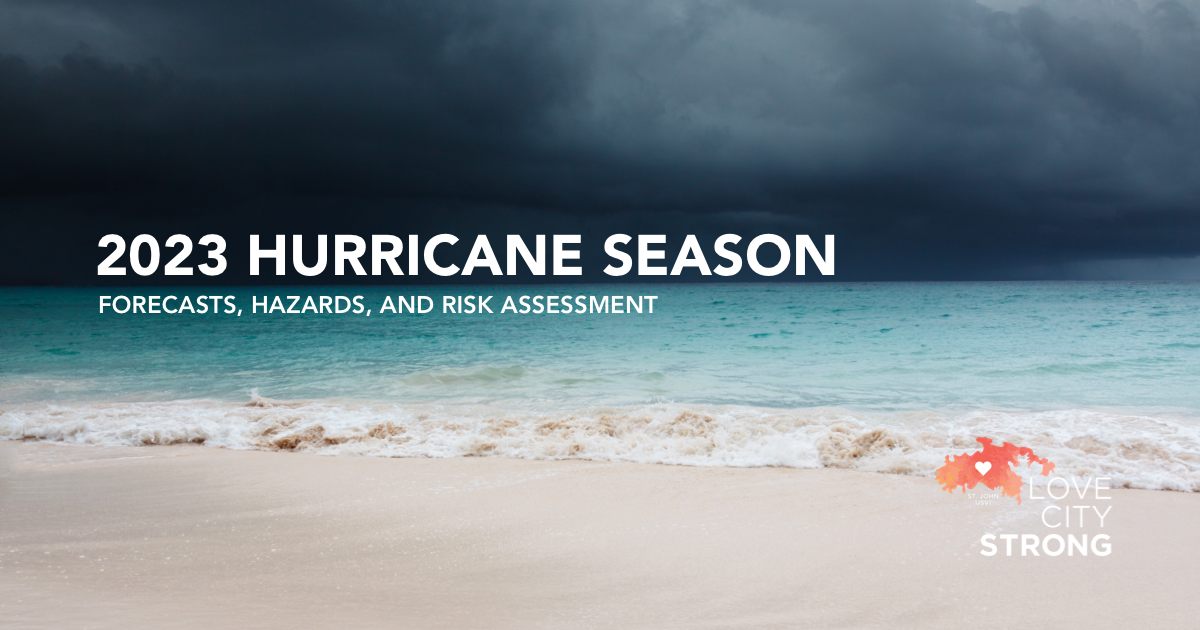
2023 Forecast
In April, Colorado State University released their first long range forecast for the 2023 Atlantic Hurricane Season. According to the research team, this season could be slightly below average due to El Niño conditions in the Pacific Ocean. Their projections are for 13 named storms, including 6 hurricanes, 2 of which they expect to be major (Category 3 or higher) storms. These numbers are slightly below the 1991 to 2020 average per year. You may be saying, below average? Great news! However, as we all know, it only takes one storm to create significant damage in our community. Even a below average season can produce above average damage for an island or region. In order to plan proactively and be prepared in the event of a disaster, we must each take a moment to step back and assess our risk, whether at home, at school, at work, or within our communities.What is Risk Assessment?
The United Nations Office for Disaster Risk Reduction defines disaster risk assessment as “a qualitative or quantitative approach to determine the nature and extent of disaster risk by analyzing potential hazards and evaluating existing conditions of exposure and vulnerability that together could harm people, property, services, livelihoods, and the environment on which they depend”. What does that mean for you? Risk assessment on a personal level is the process of taking in all the information you have about a given threat, like a potential hurricane, along with all that you know about your home and your life, and deciding how likely it is that this hazard (the hurricane) will inflict harm. In the context of the 2023 hurricane season forecast, our first inclination might be to feel relief at the prospect of a “slow season”. However, upon examination maybe we remember that we haven’t had the trees on the property trimmed in a while, or that we never did find that one shutter for our bedroom window. Perhaps we recall that our neighbor down the street is still living in a home with a damaged roof, or that a member of our church needs to keep their insulin cold. Understanding the risk for wind damage or for extended power outages can help us to prepare for these needs.Understanding Hazards and Forecasts
We can often become complacent about “small” hurricanes, or “just” tropical storms, but the reality is that these systems are capable of just as much damage. Just last fall, Fiona made landfall in Puerto Rico as a Category 1 storm, but dropped more than 30 inches of rain in two days, triggering catastrophic flooding across the island. We’ve all experienced tropical systems moving through the territory that seem so much more intense than expected, with gusting winds and intense periods of rain. The reality is that these weather patterns are mercurial, subject to change and constant variability. A storm that is headed our way may, to our relief, skirt to our south, and a storm we expected to pass by at a safe distance may make a strong turn and make landfall in the territory. The best course of action is to always be prepared. Internally at Love City Strong, we generally prepare as if a storm will be two categories stronger than forecast. The same approach should be taken for rain forecasts – if we’re expected to get 2 to 4 inches, imagine what the impact would be of 6 to 8 inches, and prepare for that. Over prepared is always best. As we count down until the start of hurricane season on June 1st, it’s important to be proactive and plan ahead. Fire up your generator, check your emergency kit, restock any necessary items. Most importantly, talk about your emergency plans with your family, your neighbors, and your colleagues. The more we normalize conversations about preparedness, the more easily we can support each other in times of crisis.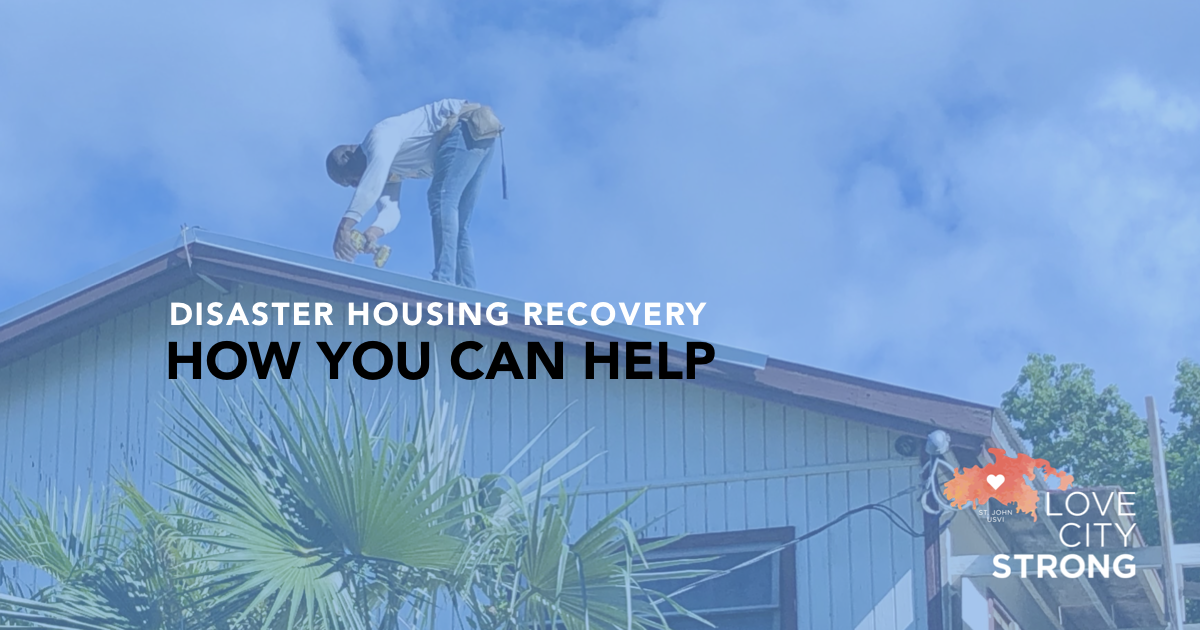
Sustainable long term recovery requires dedicated participation across all sectors of the impacted community. Importantly, it must include equitable access to safe and storm-strong housing for all. As St. John and the U.S. Virgin Islands continue to recover from Hurricanes Irma and Maria, safe and affordable housing continue to be a leading concern. At Love City Strong, our slate of housing recovery programs is designed to support those residents particularly who have struggled most to recover, while also alleviating pressure on the housing market by increasing available inventory.
A core element of our Disaster Housing Recovery and Mitigation program is a focus on partnerships with local business and contractors in order to complete minor and full rebuilds. This approach ensures not only that recovery dollars stay within the territory, but also that skills and resources are cultivated and maintained, supporting a more prepared island as a whole. The Disaster Housing Recovery and Mitigation Program includes several distinct projects: Our Resilient Housing Initiative (RHI), the RHI Mitigation project (RHI-MIT), and a $7.8M FEMA Hazard Mitigation Grant Program Residential Wind Retrofit project (WRP). Since 2018 we have rebuilt 36 homes through RHI, completed accessibility and safety related repairs on 6 more homes through RHI-MIT, and the Residential Wind Retrofit project will serve an additional 97 homes in the community. Despite these significant efforts, there are still many more families in need of support, and in 2023 we will be continuing our housing recovery efforts through these programs, as well as exploring new projects and solutions.
Throughout the month of November, you have the opportunity to contribute to the Love City Strong Disaster Housing Recovery and Mitigation program, while entering for a chance to win an ‘Emerald Ticket’ to St. John. This package includes accommodation, transportation, and gift certificates for dining, shopping, and activities.
Visit https://go.rallyup.com/emeraldticketstjohn for more details about this package, or to purchase tickets.
For more information on our housing programs, or to sponsor a rebuild, contact mae@lovecitystrongvi.org
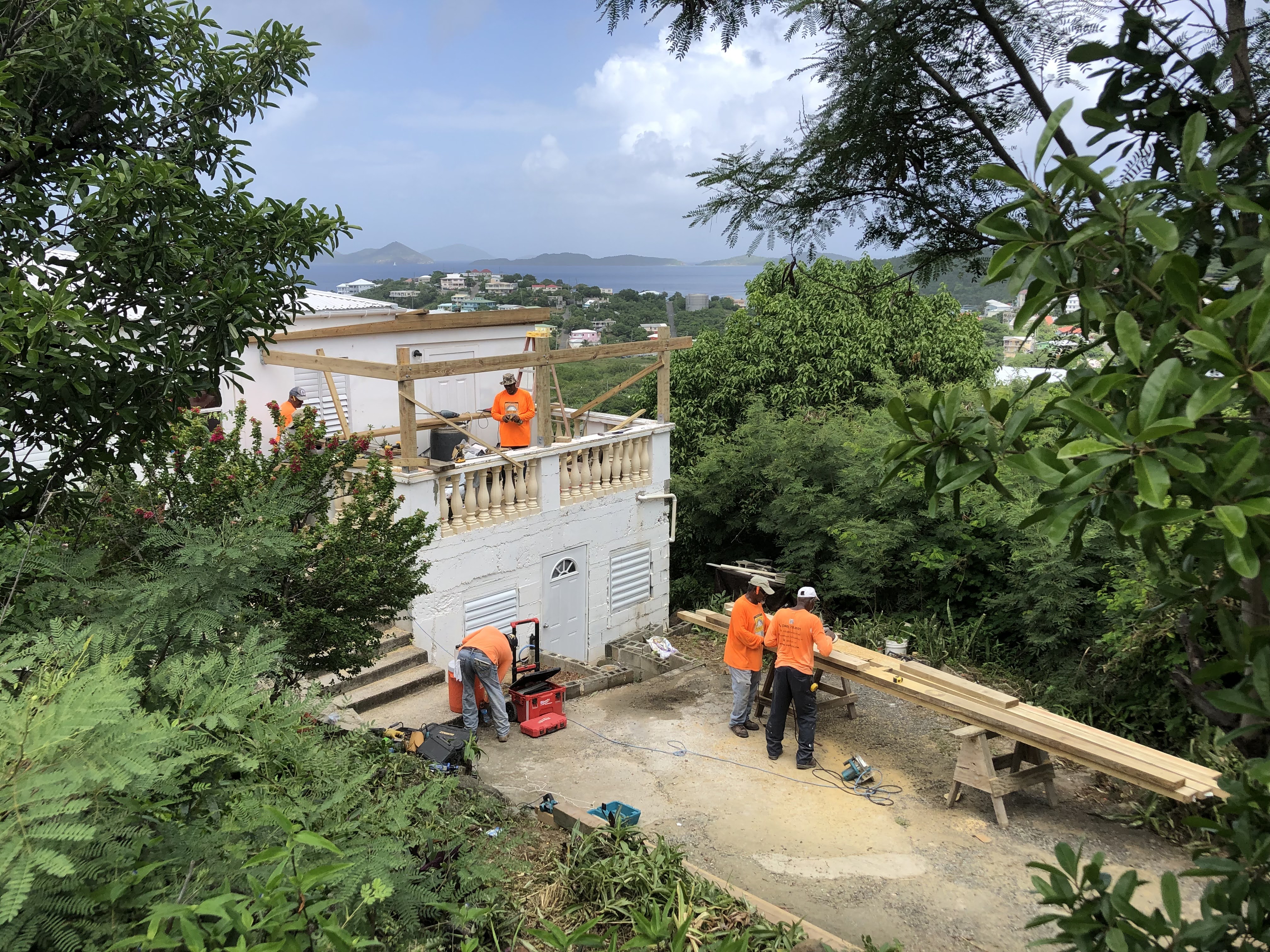
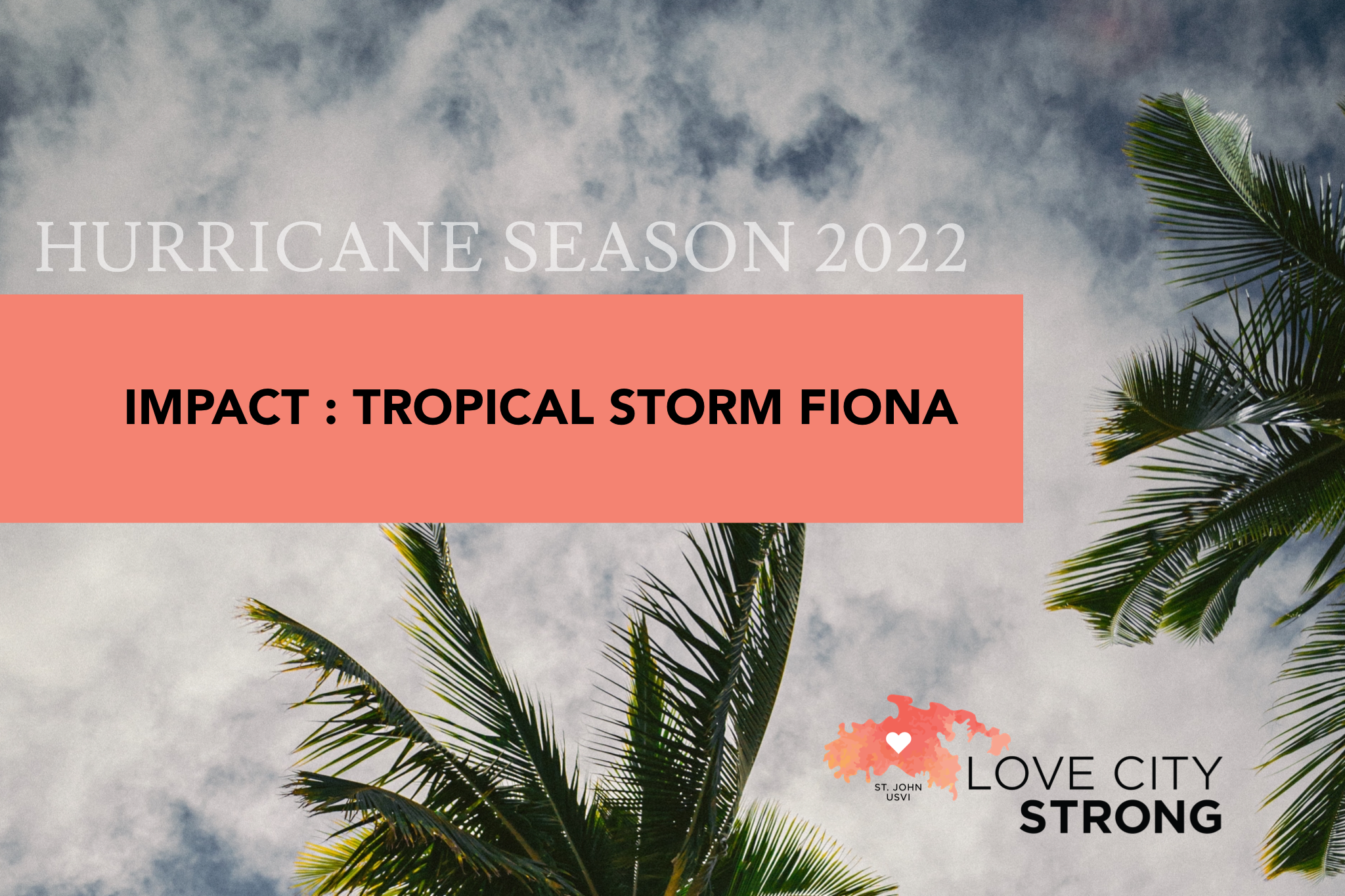
Hurricane Fiona is pulling away from the Territory and leaving destruction in her wake across Puerto Rico, the Dominican Republic, and Turks and Caicos. Here in the USVI, we can reflect on how fortunate we were in this instance.
After all, we face many of the same challenges as our neighbors in Puerto Rico. Our Territory is also still in recovery five years after Hurricanes Irma and Maria. Our infrastructure reconstruction and hardening are far from complete. When the ground is saturated, as it often is by this point in the hurricane season, heavy rains can cause flooding in our watersheds. This in turn can wash out roads and retaining walls. Residents still living under partially or completely tarped roofs are at increased risk during even a passing rainstorm, let alone a tropical storm or hurricane. Our situation is always precarious when it comes to tropical weather, and we do ourselves a disservice to underestimate the impacts.
It can feel easy to dismiss a storm like Fiona as “just” a tropical storm, or “just” rain. However, clearly the impacts of torrential rain can be just as devastating as high winds, if not more so. It is important that we learn how to talk about these hazards in ways that accurately communicate risk. We must use the tools that are available and think critically about incoming weather. That way, we can make informed decisions about our own safety and wellbeing.
As Fiona passed south of the USVI this weekend, the storm slowed significantly. When a system’s forward motion slows from 15 mph to 8 mph, that results in an adjustment to the impact window. Sometimes it can shift by days. When creating emergency plans, whether for household or business, it’s critical to keep up to date on the latest information, and to interpret what that information will mean for you and for the plan you have in place.
Perhaps you think that a storm will “finish” at a certain time, and make plans for how to resume your daily routines. When that time arrives, a glance outside shows clearly that the storm is not over. A comprehensive emergency plan should include fall backs and alternatives for situations like this.
It’s also important to know what informational tools you have at your disposal. There are countless apps that will keep you updated on developments in the tropics, websites that will offer the latest tracking, and TV and YouTube Channels that will provided detailed analysis. Building a good network of information will help ensure that you are prepared and well informed no matter what the impact.
The truth is, preparedness is always a work in progress. When you are dealing with complex systems like tropical weather, layered on top of equally complex systems like Caribbean islands in the midst of recovery, there are always elements of the unknown. However, by doing our best to take in good data, build good habits, and think critically, we can all grow more prepared over time.
Here are some of my trusted resources for forecasts and analysis:
Hurricane Tracker App (available in the App Store and Google Play)
NHC.NOAA.GOV : for regular updates, straight from the source (the National Hurricane Center)
Track the Tropics : for detailed models and analysis
Tropical Tidbits : particularly useful for forecast models
Mr. Weatherman : a relatively new, no-hype forecast channel on YouTube that gives comprehensive coverage to Caribbean islands
Additional apps for hourly weather forecasts:
Dark Sky
Clime: NOAA Weather Radar
Weather Underground
Windy.com

One of the most important parts of preparedness is creating back up copies of your critical documents. For many years this meant physical copies. However, in the aftermath of a storm, even those individuals who have prepared copies of their documents can face challenges in managing all of their paperwork and retaining it for practical use. Paper records can be damaged by the elements, leaving them illegible or completely destroyed. Those who need to evacuate or relocate multiple times during the course of a disaster may lose or inadvertently damage documents.
Today the most efficient means of backing up your documents is to make digital copies, and to store them on an external drive. Storing scanned versions of your critical documents on an external drive can make filing insurance claims easier after a disaster. It can expedite processing with FEMA, and also help move along the replacement of lost or damaged items.
Love City Strong believes that document preparation and storage is a vital and oft-overlooked aspect of personal preparedness. This summer, we are holding a series of pop-ups to assist residents in scanning their documents onto a portable USB drive. Priority will be given to seniors, families, and residents with a disability or nonemergency medical need. Individuals are then encouraged to place these USB drives in their disaster preparedness kit alongside their other personal preparedness items.
For those whom do not have a personal computer at home or have lost their computer due to a disaster, portable devices such as a USB can be brought to community resources (such as nonprofits) whose employees and agents can then in turn print out copies for individuals to then bring to a federal agency employee at a Disaster Recovery Center (DRC).
A suggested list of documents to bring in and have scanned includes, but is not limited to:
- Birth certificates
- Driver’s licenses
- Social security cards
- Proof of home and land ownership documents
- Proof of rental
- Tax records
- Financial records
- Energy and Internet bills or statements which have meter/account numbers on them
- Insurance documents
- Medical information
- Vehicle documents
- Dependent documents
- Pictures of the interior and exterior of your home
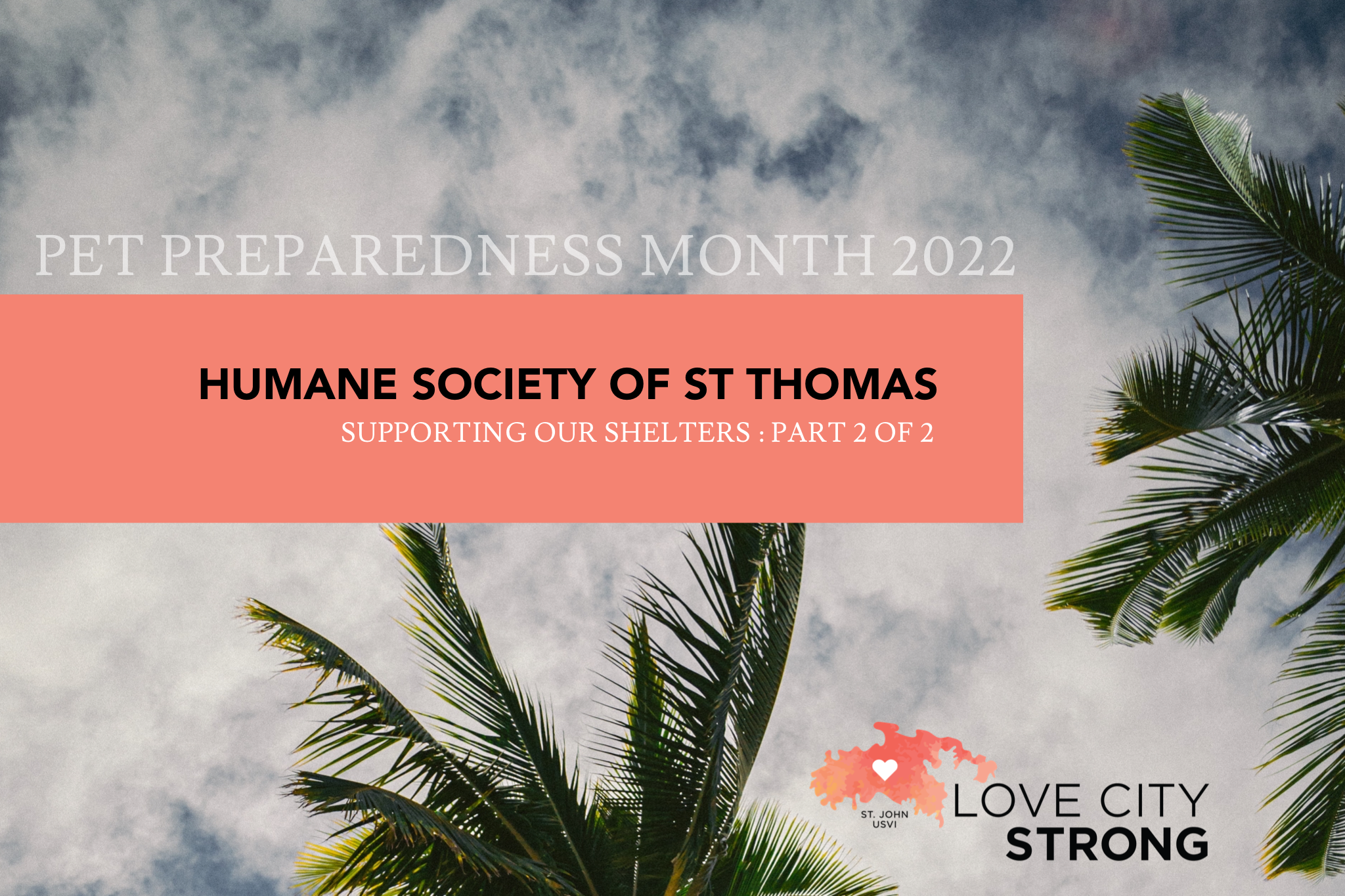
This week as part of Pet Preparedness Month, we spoke with the Humane Society of St. Thomas about their hurricane preparedness plans, particular seasonal needs, and tips for pet owners trying to keep their pets safe and comfortable during a storm. Read on for their great advice and to learn how you can help!
- What does the shelter do to prepare for hurricanes?
- How can residents help make sure that more animals don’t end up in shelters following a storm? How can people keep their pets safe during a storm?
- Food: At least a three-day supply in an airtight, waterproof container.
- Water: At least three days of water specifically for your pets.
- Medicines and medical records: Most boarding kennels, veterinarians and animal shelters will need your pet’s medical records to make sure all vaccinations are current in case of emergency.
- Important documents: Registration information, adoption papers and vaccination documents. Talk to your veterinarian about microchipping and enrolling your pet in a recovery database.
- First aid kit: Cotton bandage rolls, bandage tape and scissors; antibiotic ointment; flea and tick prevention; latex gloves, isopropyl alcohol and saline solution. Including a pet first aid reference book is a good idea too.
- Collar or harness with ID tag, rabies tag and a leash.
- Crate or pet carrier: Have a sturdy, safe crate or carrier in case you need to evacuate. The carrier should be large enough for your pet to stand, turn around and lie down.
- Sanitation: Pet litter and litter box if appropriate, newspapers, paper towels, plastic trash bags and household chlorine bleach.
- A picture of you and your pet together: If you become separated, a picture of you and your pet together will help you document ownership and allow others to assist you. Add species, breed, age, sex, color and distinguishing characteristics.
- Familiar items such as treats, toys and bedding can help reduce stress for your pet.
- Does the shelter need more fosters for the animals if a storm is coming?
Moxie: 2 year old female Retriever / Basset Hound mix. 48 pounds. Moxie is HW-, and such a lover! Moxie loves to love and will kiss you at any chance she can get!

Abu - The sweetest big boy! 55 pounds, about 4-5 years old. HW+, dog friendly, very calm, good on leash, would love another dog friend around!

Moxie is a 2 year old female Retriever / Basset Hound mix. She is 48 pounds, HW-, and such a lover! Moxie loves to love and will kiss you at any chance she can get!
Abu – The sweetest big boy! 55 pounds, about 4-5 years old. HW+, Abu is dog friendly, very calm, good on leash, and would love another dog friend around!
- Does the shelter have any specific needs to be prepared for this hurricane season?


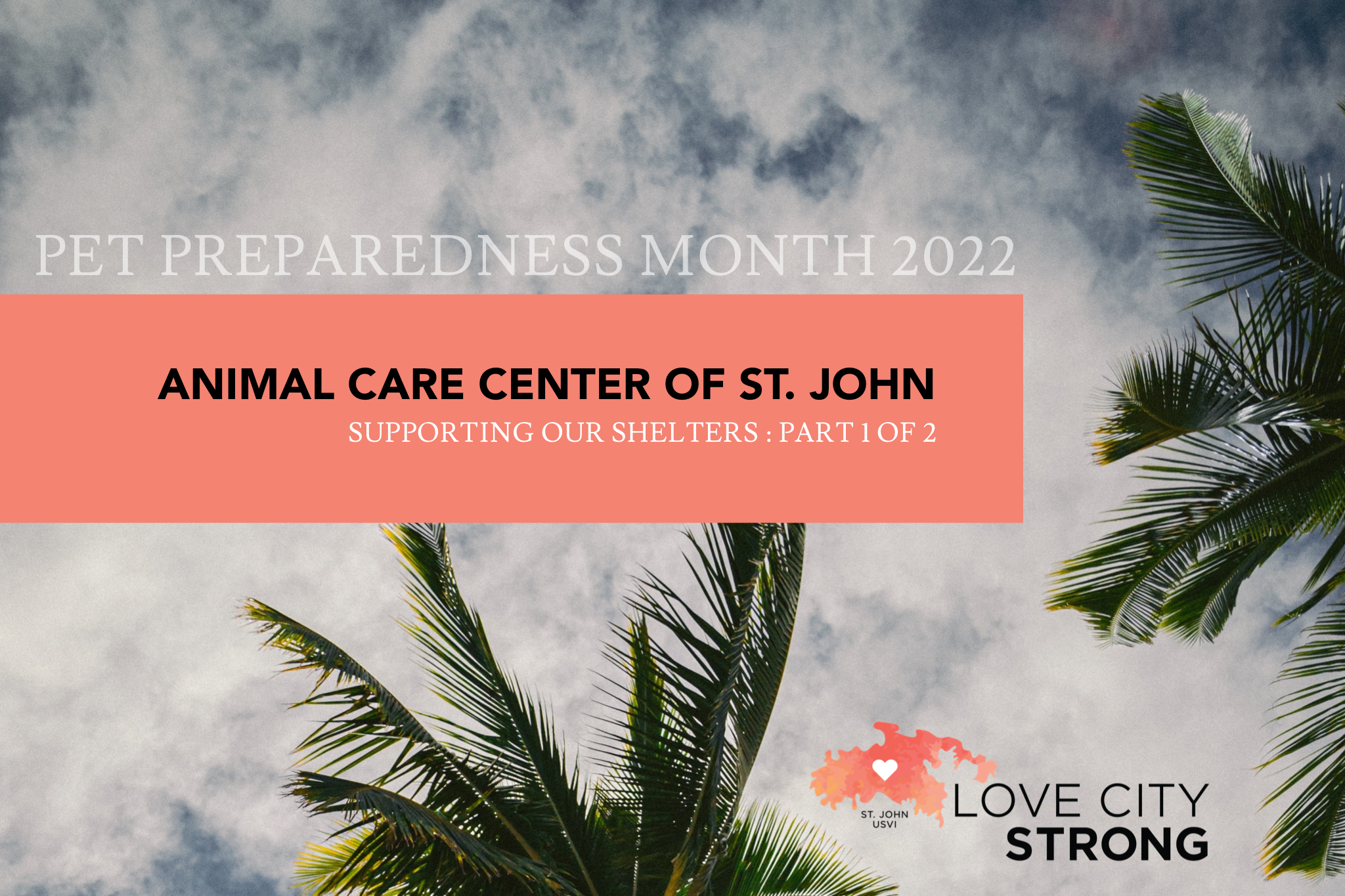
When a major hurricane impacts the Territory, many support services are interrupted or stretched beyond their capacity. In the context of Pet Preparedness Month, we wanted to reach out to the animal shelters on St John and St Thomas to learn more about how they prepare, and how the community can help.
- What does the shelter do to prepare for hurricanes?
- How can residents help make sure that more animals don’t end up in shelters following a storm? How can people keep their pets safe during a storm?
- Make sure your dog or cat has some sort of ID. Microchips are best. If owners get their pets chipped and they end up in a shelter, they can scan the pet to figure out where they belong. The ACC now provides this service for residents if they want it done.
- Write a number on your pet’s collar with a sharpie as an extra precaution.
- Many dogs on island live outside, so these identifiers are really important, as well as making sure these animals have a safe place to ride out the weather – which is not leaving them in the yard on a tie out to fend for themselves.
- It’s important for families who travel during the summer to make sure you have a plan in place for pets if with a pet sitter. In case they get stuck stateside and the animals are being watched here. We saw numerous situations like that during Irma. We ended up having to step in to help these owners get their pets back.
- Does the shelter need more fosters for the animals if a storm is coming?
- Does the shelter have any specific needs to be prepared for this hurricane season?
The Animal Care Center of St. John recommends that pet owners use this checklist when preparing their pets for disasters.
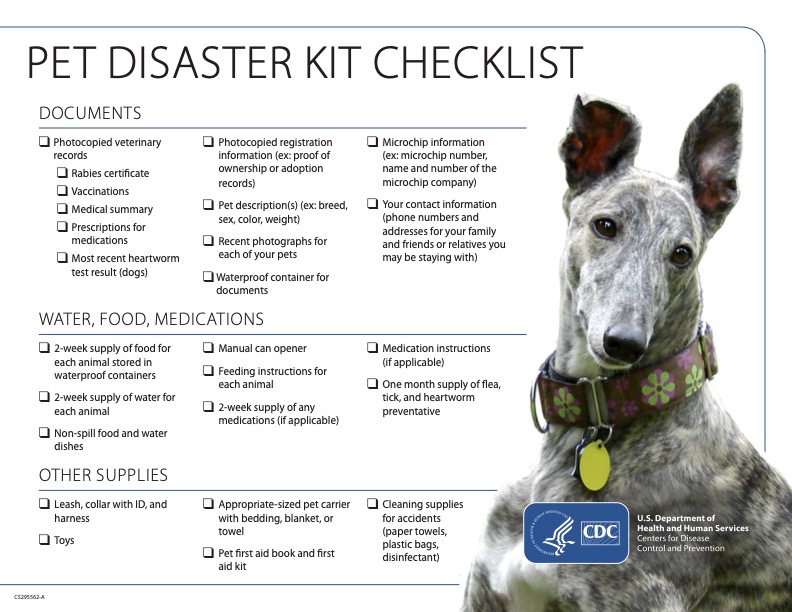
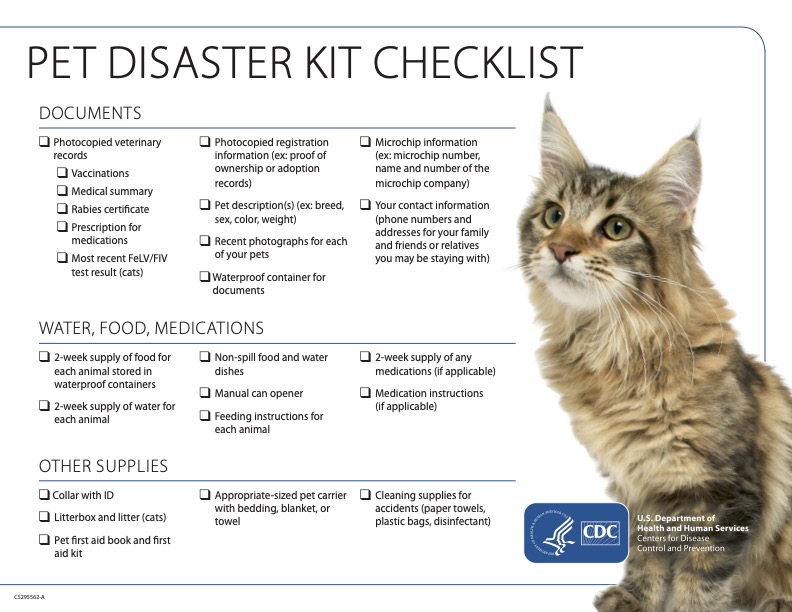
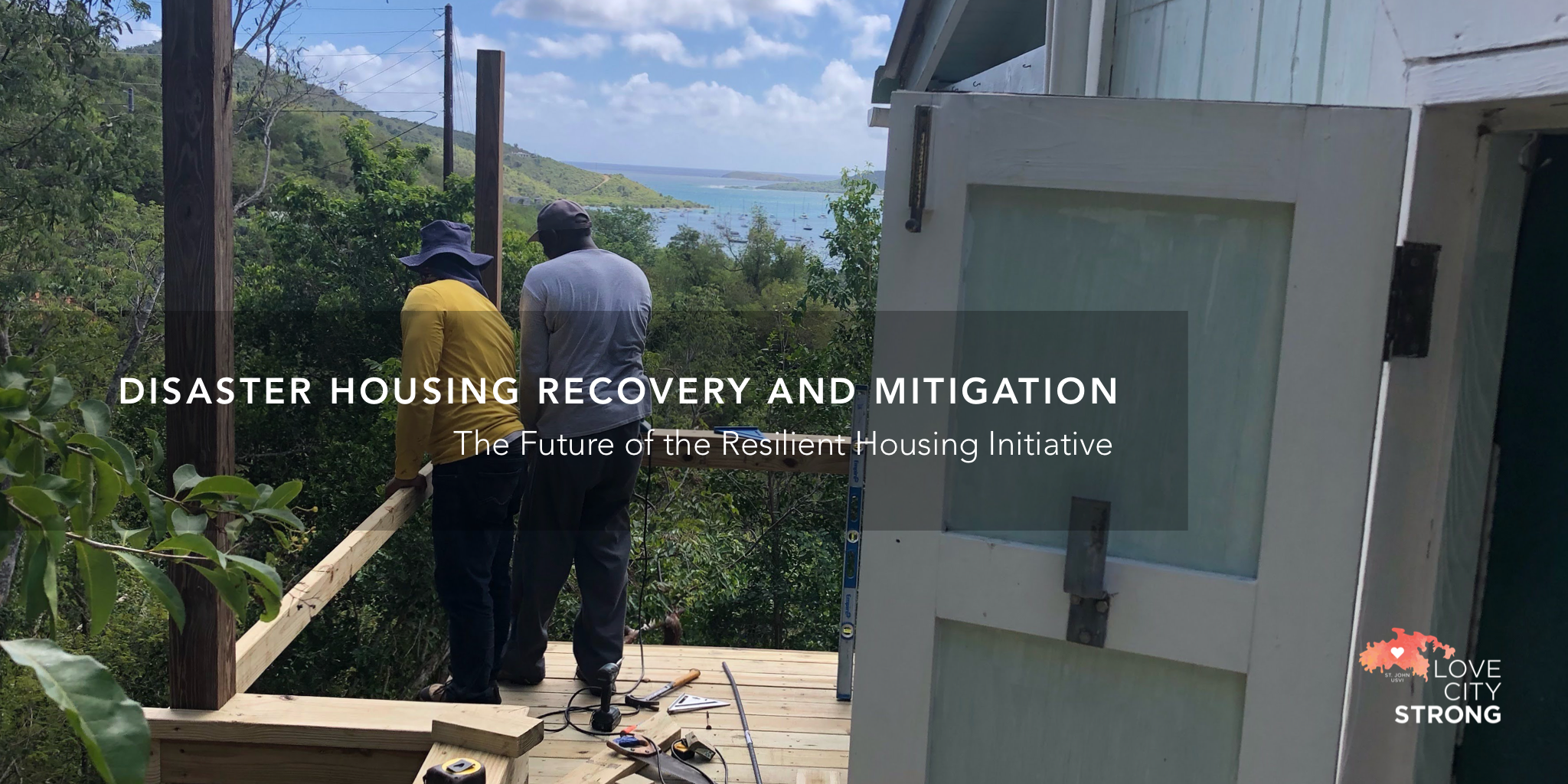
Housing is one of the most complex parts of recovery after a disaster. After the hurricanes in 2017, HUD estimated that 74% of low and middle income homes on St. John were damaged. Since 2018, Love City Strong has partnered with several other nonprofits, along with St. John-based construction companies and dozens of qualified local professionals to help create the Resilient Housing Initiative (RHI).
RHI has rebuilt 36 homes to date. Notably, we have been the sole source of reasonably priced recovery solutions for these homes.
Throughout 2020 and 2021, it became clear that recovery challenges were increasing because of the COVID-19 pandemic. Global supply logistics, coupled with widespread economic downturns and access to affordable labor hindered a return to safe, accessible homes.
In October of 2021, we received a grant through the Community Foundation of the Virgin Islands, with funding provided by the Island Spirit Fund. Cruzan®Rum, along with Global Giving, established The Island Spirit Fund to support disaster relief. It issues grants to local organizations with boots on the ground and lasting relationships in affected areas. Specifically, this grant was awarded to help with repairs on the hurricane damaged homes of two St. John residents.
This funding came at a critical point. Due to the changing needs of our clients, we worked to expand the impact of the RHI program. In effect, by including smaller scopes of work, we allow for progress across more of the community. Furthermore, St. John is in the midst of a severe affordable housing crisis. As a result, each home repaired and made more accessible relieves pressure on the housing market.
In 2022, we will continue RHI, and take a mitigation based approach. In other words, we will make relatively smaller investments to limit more serious future damages. Qualifying permanent residents include:
- Seniors
- Low and middle income families
- Single parent families
- Pregnant women
- Residents with a disability or chronic health conditions.

In 2017, a group of volunteers came together that would become Love City Strong. I doubt any of us could imagine that day what the next four years would bring. Certainly pandemics were not on our horizon at that time!
Since then, LCS has worked with the public and private sector on projects relating to disaster response, recovery, and resilience. Resilience is a cross-sector exercise, including preparedness, sustainability, and health and wellness. Our projects are designed to increase the Territory’s capacity across all of these sectors.
In 2020 and 2021, LCS, like the rest of the world, had to adapt to new realities. Our COVID-19 related projects included:
- Outreach and education about COVID-19
- Food security
- COVID-19 vaccine outreach
- Logistical support
